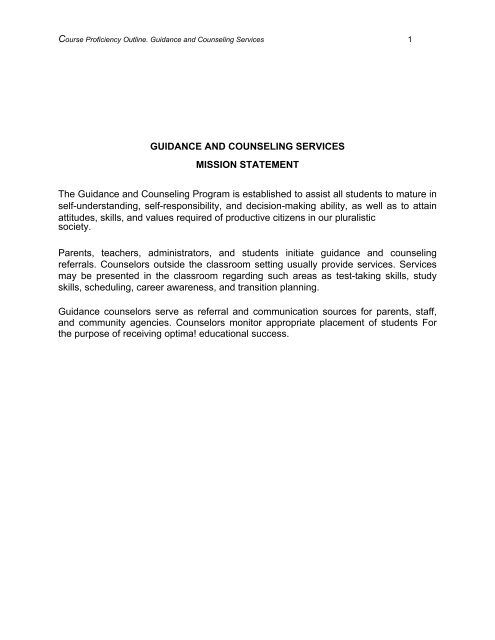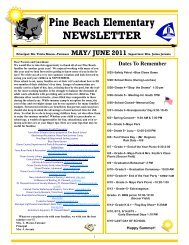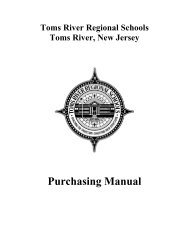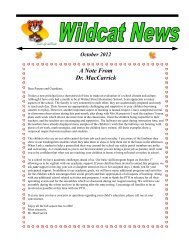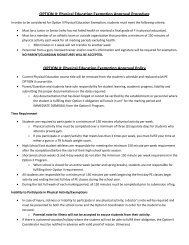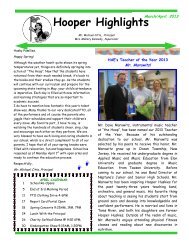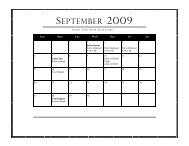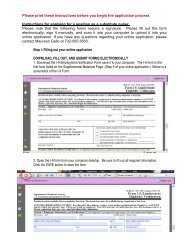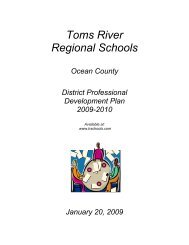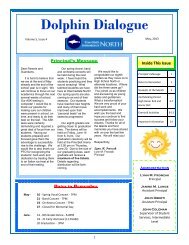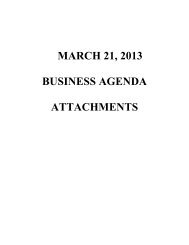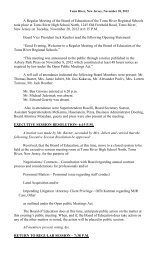GUIDANCE AND COUNSELING SERVICES MISSION STATEMENT ...
GUIDANCE AND COUNSELING SERVICES MISSION STATEMENT ...
GUIDANCE AND COUNSELING SERVICES MISSION STATEMENT ...
You also want an ePaper? Increase the reach of your titles
YUMPU automatically turns print PDFs into web optimized ePapers that Google loves.
Course Proficiency Outline. Guidance and Counseling Services 1<br />
<strong>GUIDANCE</strong> <strong>AND</strong> <strong>COUNSELING</strong> <strong>SERVICES</strong><br />
<strong>MISSION</strong> <strong>STATEMENT</strong><br />
The Guidance and Counseling Program is established to assist all students to mature in<br />
self-understanding, self-responsibility, and decision-making ability, as well as to attain<br />
attitudes, skills, and values required of productive citizens in our pluralistic<br />
society.<br />
Parents, teachers, administrators, and students initiate guidance and counseling<br />
referrals. Counselors outside the classroom setting usually provide services. Services<br />
may be presented in the classroom regarding such areas as test-taking skills, study<br />
skills, scheduling, career awareness, and transition planning.<br />
Guidance counselors serve as referral and communication sources for parents, staff,<br />
and community agencies. Counselors monitor appropriate placement of students For<br />
the purpose of receiving optima! educational success.
Course Proficiency Outline. Guidance and Counseling Services 2<br />
<strong>GUIDANCE</strong> <strong>AND</strong> <strong>COUNSELING</strong> <strong>SERVICES</strong><br />
Kindergarten through Grade 6<br />
The elementary counselor works within the educational" framework and the child's total<br />
home/school environment to enable the child to understand his identity and to learn to<br />
make choices and decisions which lead to effective functioning as a worthwhile human<br />
being. The school counselor is available to any student that might be having difficulties<br />
in the classroom, on the playground, or at home that may hinder his/her learning<br />
process.<br />
The school counselors are available for all children, their parents, teachers, and other<br />
staff members who are involved with the child. As a member of the school staff, each<br />
counselor has many responsibilities. These can be grouped according to six major<br />
functions: counseling, consultation, coordination, conferences, testing, and instruction.<br />
There are generally three types of referrals: student referrals, parent referrals, and<br />
school personnel referrals. (Teachers, Administration, Child Study Team, Nurse, etc.)<br />
At the student's request, the counselor may talk with the student and if the ~# counselor<br />
feels continued counseling could be beneficial to the student, the parent is contacted<br />
and a permission form is sent home for parent approval. When a parent, teacher, or<br />
other school personnel refers a student for counseling, a permission form is sent home<br />
for parent approval.<br />
Often a parent conference is helpful. This may be done at a scheduled conference or on<br />
the telephone. If parents wish to contact the elementary counselor , they may do so by<br />
phoning the individual school for an appointment. Parents will always remain the most<br />
important link in the chain of communication between school and the home in providing<br />
the best educational program for each child.<br />
Each elementary counselor has had experience as a classroom teacher and possesses<br />
state certification for counseling and teaching.<br />
REVISED: August 1994 July 1996
Course Proficiency Outline. Guidance and Counseling Services 3<br />
<strong>GUIDANCE</strong> <strong>COUNSELING</strong> <strong>SERVICES</strong> IN THE ELEMENTARY SCHOOL<br />
The Elementary Guidance Counselor is a certified professional educator available for all<br />
children, their parents, teachers, and other staff members who are involved with the<br />
overall well being of each child. As a member of the school staff, each counselor has<br />
many responsibilities, which can be grouped according to these major functions:<br />
counseling, consultation/conferences, coordination, testing, and instruction.<br />
A. <strong>COUNSELING</strong><br />
1. Individual counseling is a personal, one-to-one meeting between a<br />
counselor and a student during which time they work together on a<br />
problem or interest area. This is a private, trusting relationship, and kept<br />
as such unless a student's welfare is in jeopardy. The goal is to help<br />
facilitate personal growth and development, an understanding of the<br />
importance of physical, mental, and emotional health, the development<br />
of effective communication skills, and the fostering of interpersonal skills<br />
to relate well to others.<br />
2. Group Counseling encompasses the same basic parameters as individual<br />
counseling, but in groups comprised usually of three to five children who<br />
share a common problem, interest or goal. These may include, but are<br />
not limited to, divorce, school phobia, improvement of behavior, and work<br />
study skills. Groups may use role-playing, directed discussions, interactive<br />
games, or other methods to improve communication skills and to help<br />
children learn to cooperate and solve problems together.<br />
B. CONSULTATION/CONFERENCES assure a coordinated team effort to address<br />
the needs of the child in order to help create a positive school climate in which<br />
children can learn. This also enhances open communication to prepare children<br />
for the school environment and to identify those children who have special<br />
needs.<br />
C. COORDINATION ensures access to the services of other professionals,<br />
including the Child Study Team members, mental health workers, and other<br />
community agencies that provide appropriate services and opportunities, which<br />
promote maximum development. Counselors are sometimes included as<br />
members of their schools' Pupil Assistance Committees.
Course Proficiency Outline. Guidance and Counseling Services 4<br />
D. TESTING <strong>SERVICES</strong> are provided on a needs basis at the request of the<br />
building administrators and as counselors' schedules permit.<br />
E. INSTRUCTION Counselors are available for classroom lessons on an as<br />
needs basis. They may develop lessons supporting the conventional<br />
curriculum in the following instructional areas:<br />
Study skills<br />
Test-taking skills<br />
Decision making conflict resolution<br />
Transitional planning<br />
Survival skills in today's world<br />
F. ELEMENTARY SUBSTANCE AWARENESS COORDINATION: The<br />
District Coordinator (Substance Awareness Coordinator) is a certified<br />
professional who is responsible for the development of a prevention,<br />
intervention, and support system network within the district's elementary<br />
schools.


